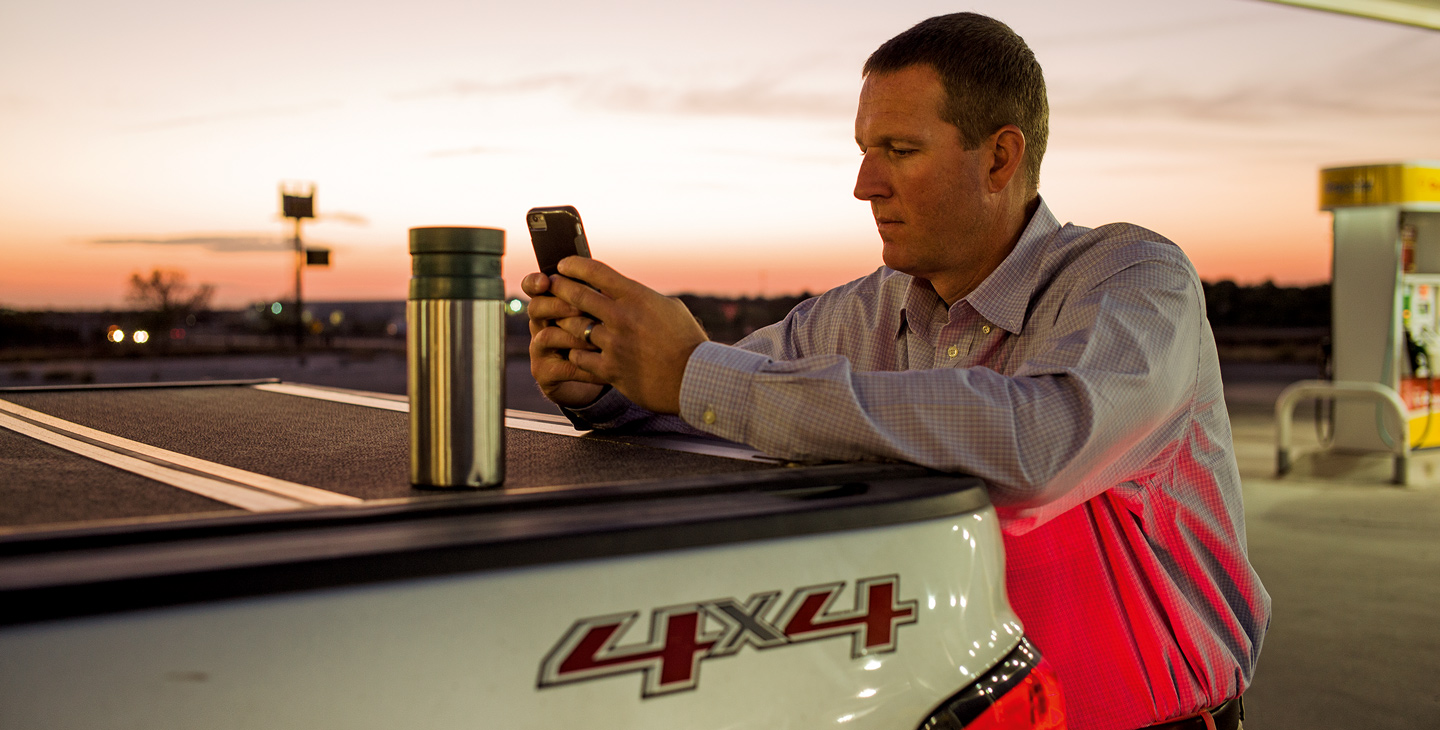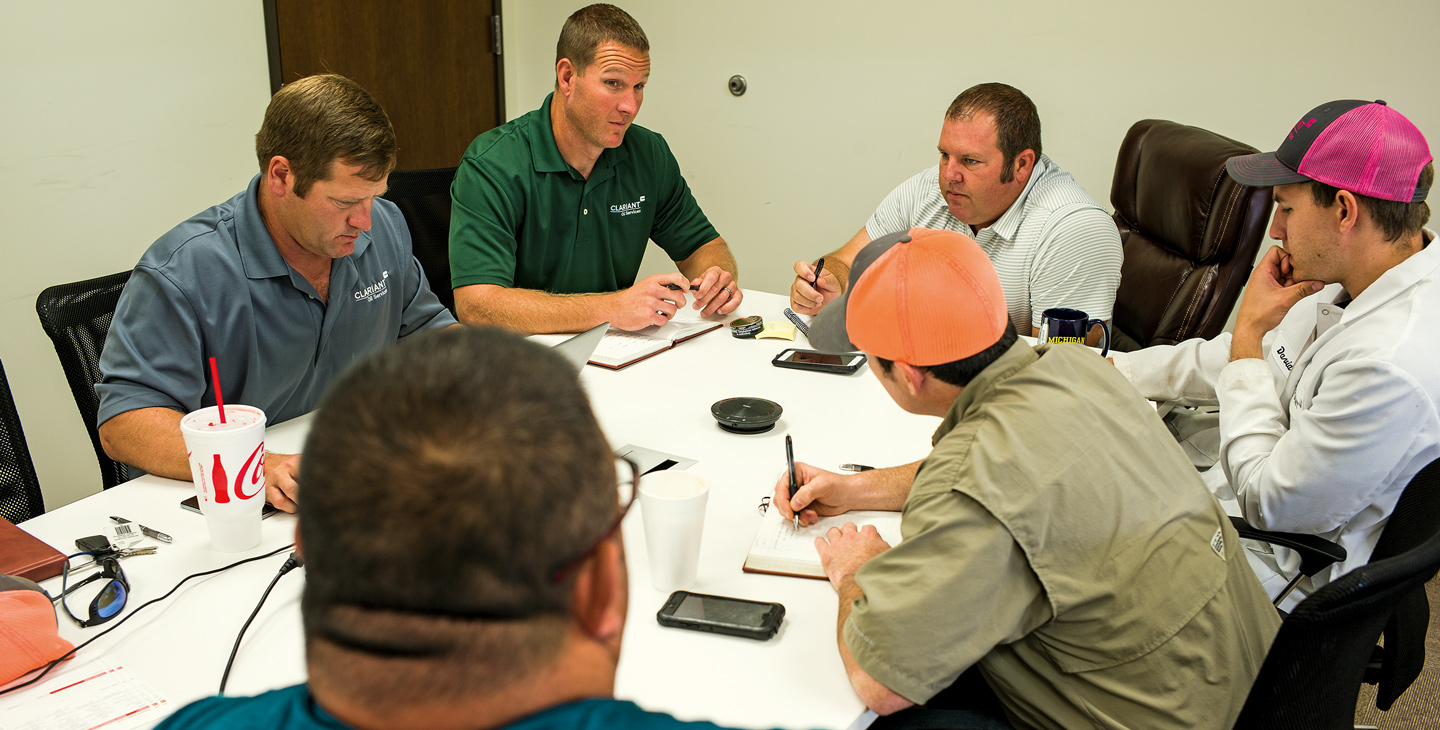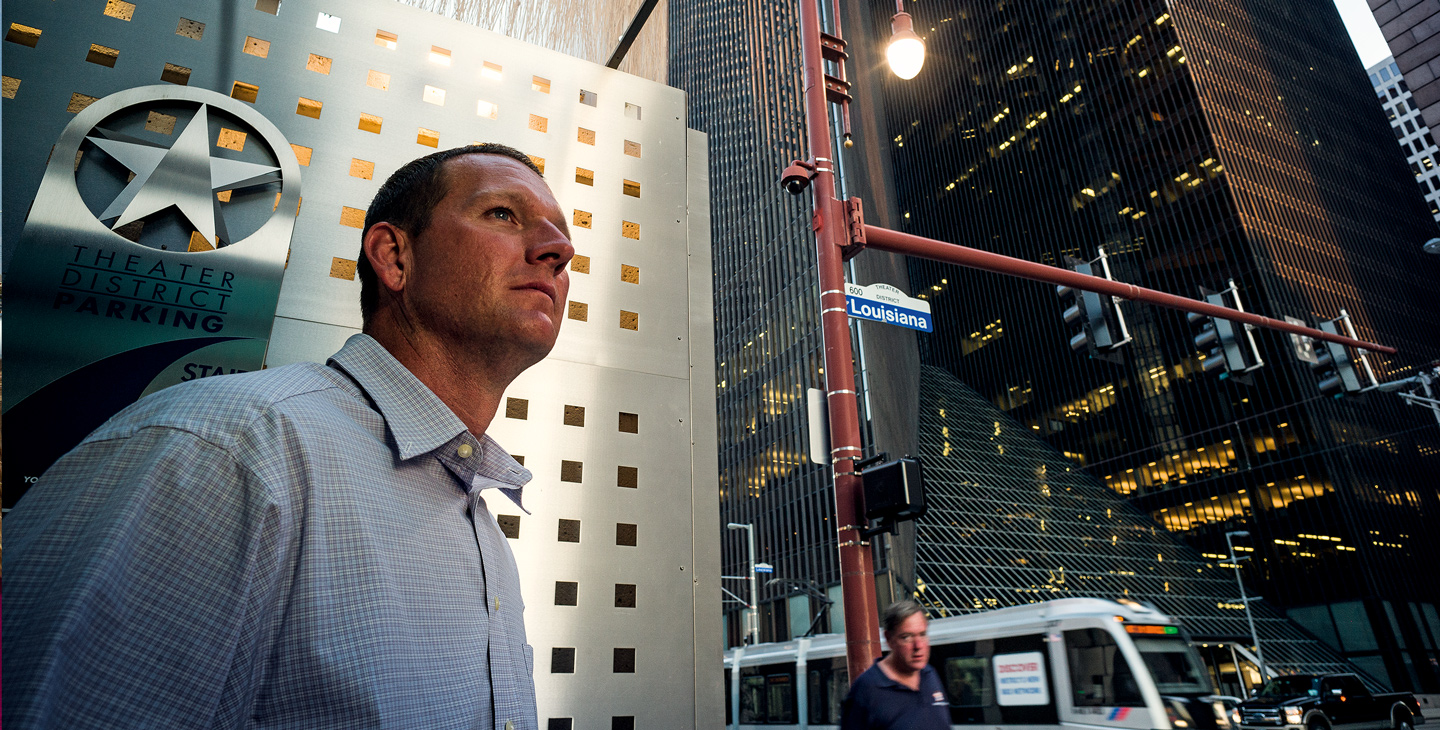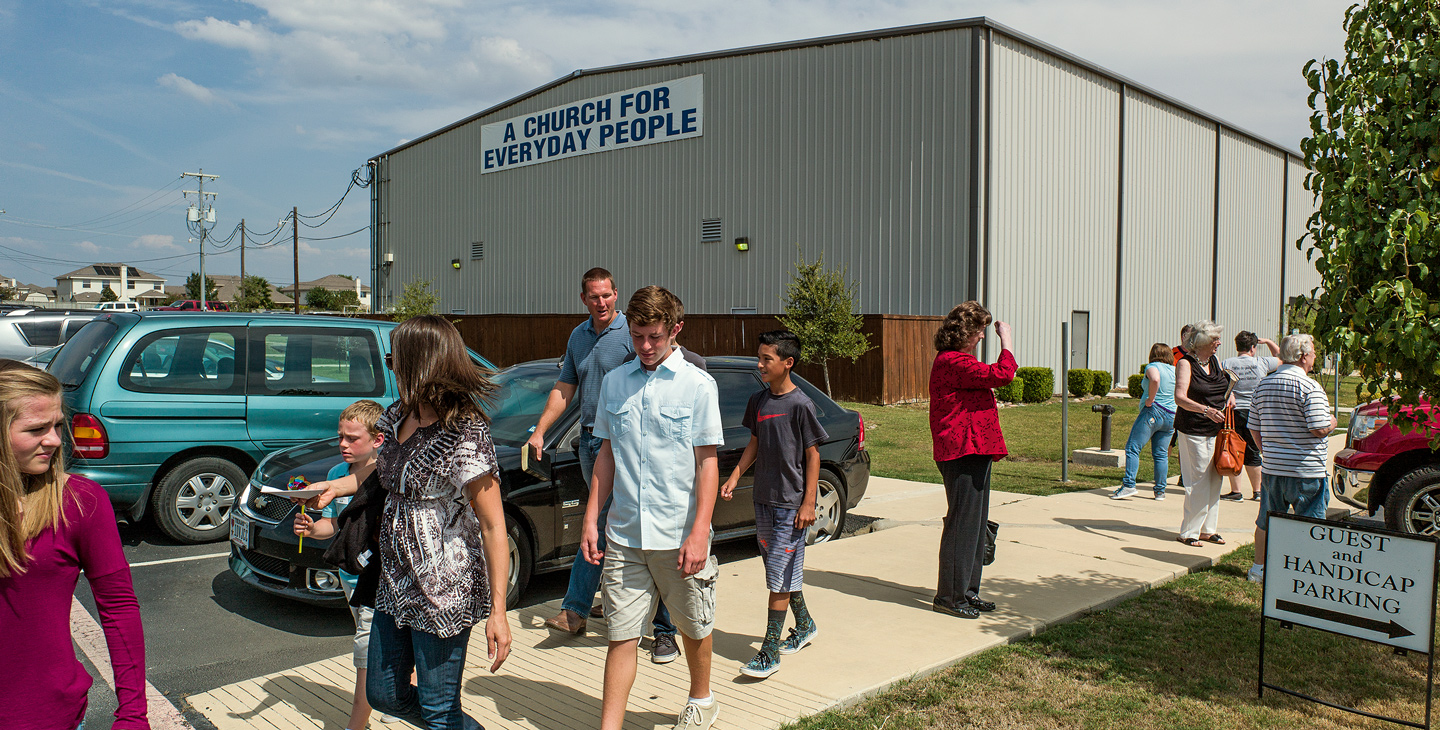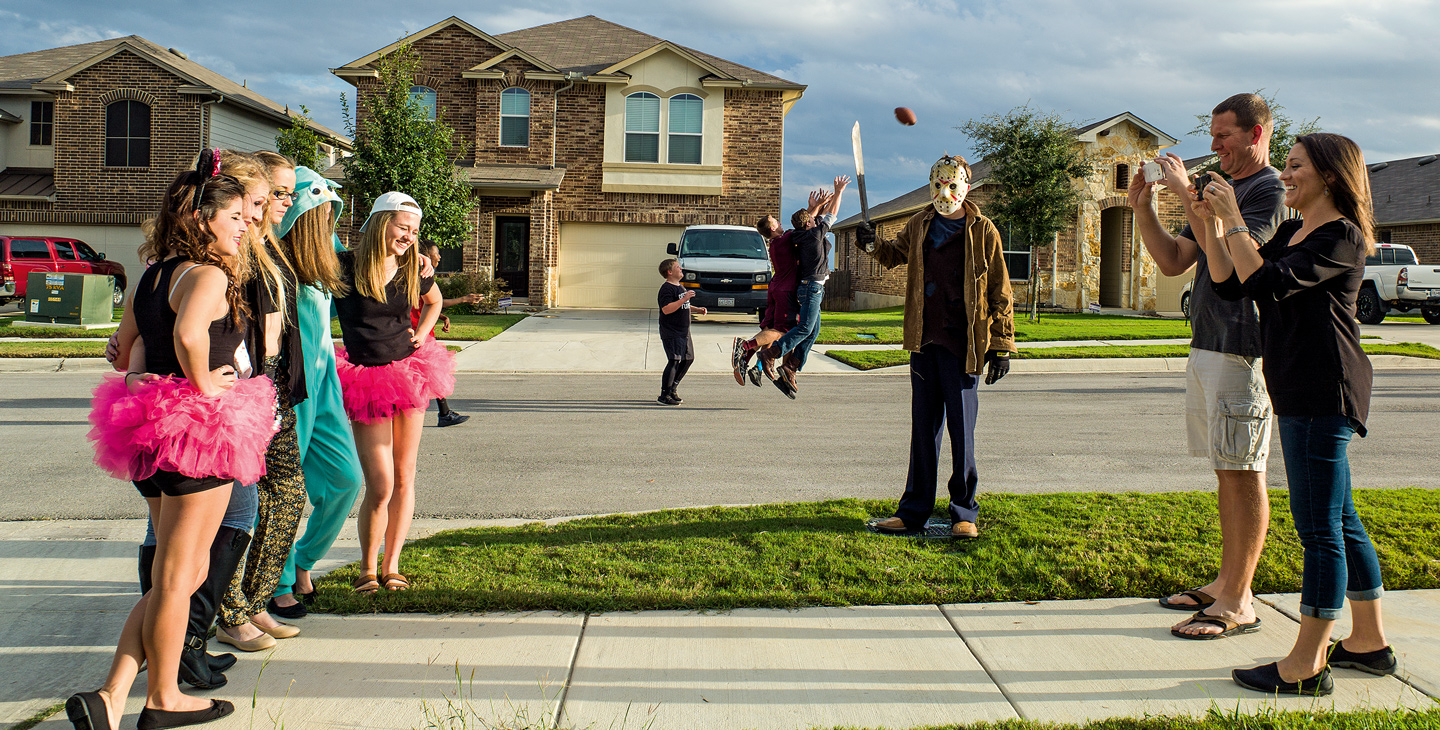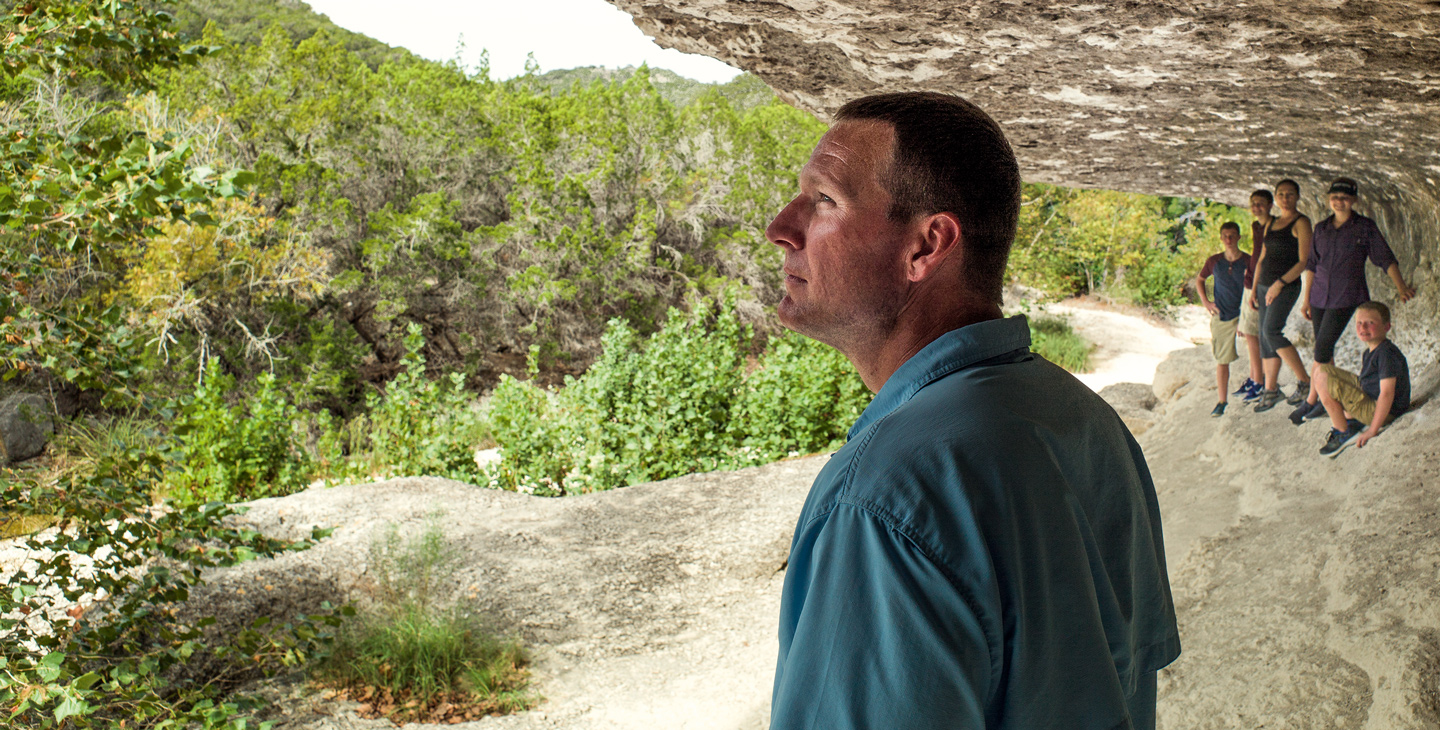
»Look at that! These are all samples of the same substance, but each of them has a slightly different color. Very light, gold, almost black… Yes, Sir! And the viscosity—always different. Isn’t it fascinating?«
James Begeal welcomes his guests on company grounds on this bone-dry afternoon. Not far from the small table by the side door, on which a number of glass containers are placed, are fresh oil samples from various sources, several thousand meters deep, which will later be analyzed in the in-house laboratory. The introduction into his profession couldn’t be more vivid. Here, in South Texas, beyond San Antonio, pretty much all activities revolve around constant oil production.
The sign next to the entrance states »Clariant Oil Services. Future Home and Laboratory«. For most, it may just be one of the many inconspicuous business buildings that stretch along State Highway 281 towards the small town of Pleasanton. Yet for the tall, athletic mid-30 year old standing in the blazing sun among tanks and barrels, it is the fulfillment of a personal dream.
»Even though the team looks at me as their boss, I’m just like them. And what they say is important. As an individual, you never know more than half of the group.«
James Begeal has always wanted to build his own team in order to be successful on a larger scale—a team made up of engaged individuals whom he trusts without reservation, and manages with a contemporary leadership style. According to him, he wanted to »form a culture« where there is left and right but no top and bottom: »Even though the team looks at me as their boss, I’m just like them. And what they say is important. As an individual, you never know more than half of the group.«
Now he has this team, of more than 40 engineers, all skilled workers and drivers hailing from Texas, Mississippi, Egypt and China. As District Manager for Oil & Mining Services, it is Begeal’s job to make sure his team in Southern Texas establishes relationships with large oil and gas producers. These businesses will always require chemicals for the right consistency of crude oil as well as a variety of services and consulting.
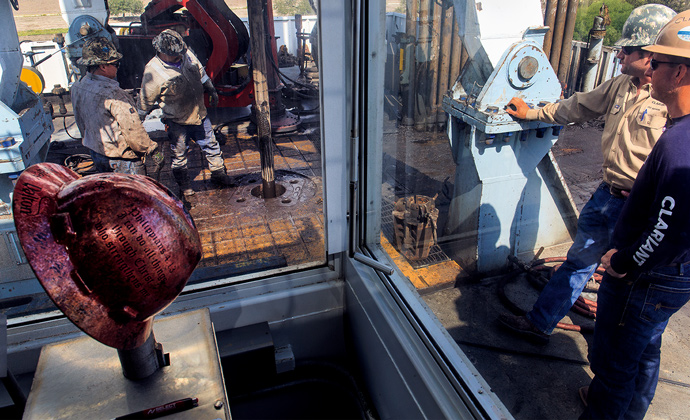
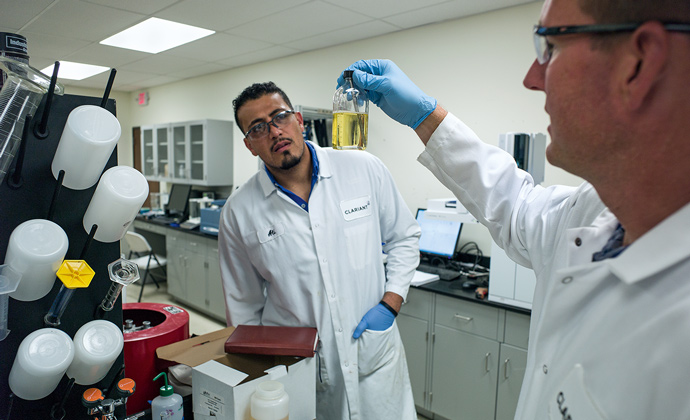
»What they get from us is a business partner; they get service, they get solutions,« Begeal eloquently explains. »Sometimes even before they realize their problems themselves. We listen and we respond to the needs of the producers. That’s what sets us apart.«
There must be something to that, as evidenced by the results. Several days later, during the monthly »All Hands« meeting on Friday, the district manager has the pleasure of presenting a positive interim status report to his team. The targeted annual revenue for 2015 has already been achieved by mid-October. By year end, it will have been significantly exceeded. This puts them »years ahead« of the internal schedule. For the leader who doesn’t want to be a boss, this is a welcome opportunity to confidently take a bow.
»This would not have been possible without your strong commitment,« he says, as he looks proudly through the ranks. »Thank you all! It is a great pleasure to work with this team and I think it is the best team I’ve ever been on.« The office conference room is filled with applause. The coffee pots, fajitas, rice and salad are then brought in for the celebration.
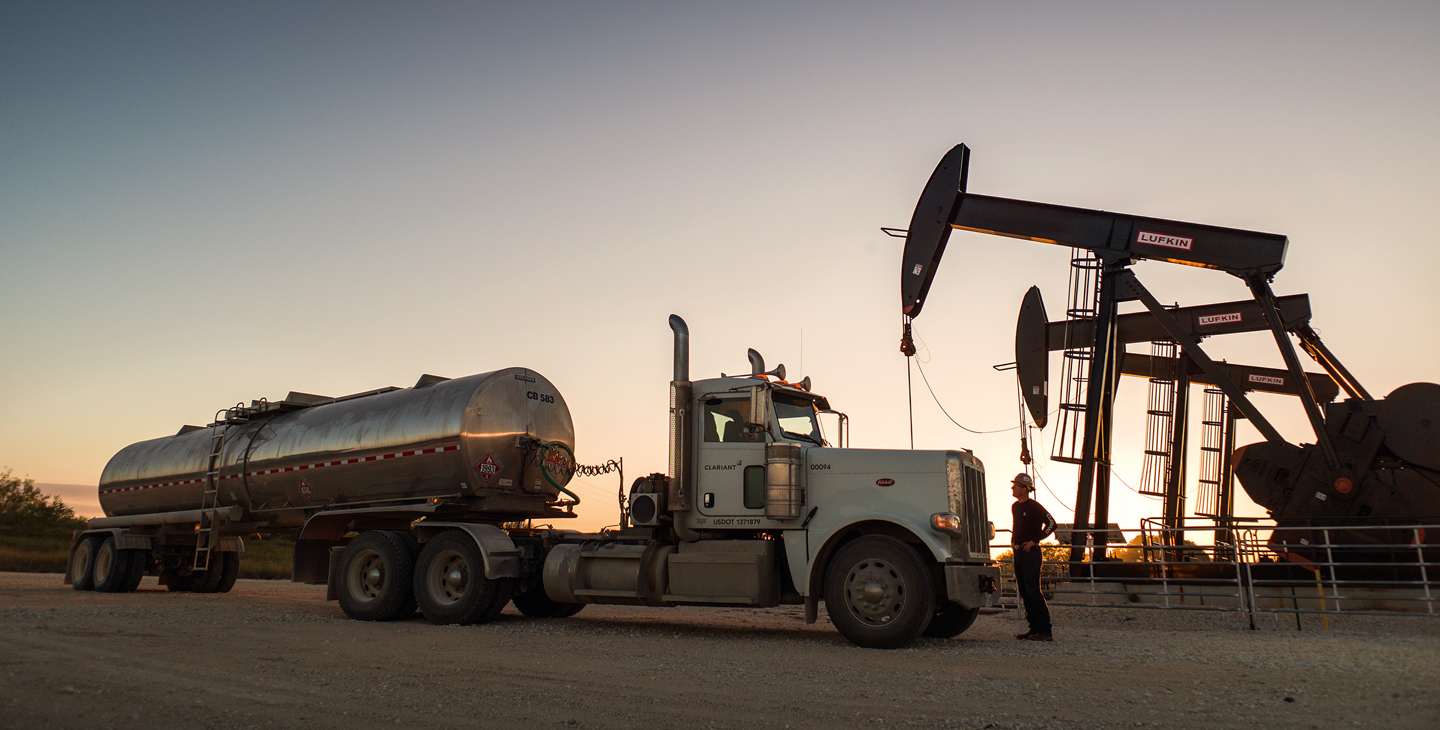
With the oil and the men who work hard to draw it from the earth, no other industry sector has so markedly characterized South Texas over such a long period of time. The 100-meter-high spout of the first well at Spindletop near Beaumont initiated the first oil boom in the Gulf of Mexico in 1901. As far back as the thirties more oil came out of Texas than in any other US state. Around 1970, »Peak Oil« was reached – the critical point where production reached its highest level.
Contrary to most predictions, however, the downturn has recently come to an end. New technologies such as horizontal drilling and fracturing, which are heatedly debated in Europe, have allowed access to deposits that were unreachable 20 years ago. This is especially true for »Eagle Ford« – a huge slate formation which extends several thousand meters deep from the north of Houston into Mexico. Through these discoveries, a new oil boom started a few years ago in low profile areas like Pleasanton in Atascosa, despite declining oil prices.
Drilling rigs and »Horsehead Pumps« (beam pumps) set the scene in this barren landscape. Interim equipment storage facilities and petrochemical plants appear every few miles. Massive tankers and trucks move quickly along the roads bordered by farm land and prairies. In their cloud of dust, James Begeal covers the 50 miles from his home on the edge of San Antonio to his office at the crack of dawn. He is almost always in a great mood, since every new day means a new promising experience. »Today is gonna be a wonderful day,« is his favorite way to greet people when he stops by the gas station for coffee.
And which work environment could be more exciting? Where James would embark on his professional journey one day was already a topic of discussion when he was growing up in Sundown, 15 miles west of Houston. In the energy capital of the world, several parents of friends were working in the oil and gas business. The tall company office towers at the city center can be seen all the way from the suburbs. »This has always been a part of me,« says Begeal, »I had just not yet had the opportunity to enter the business.« The opportunity came at a later stage when a friend took him along to his weekend job: delivering materials to the oil fields by truck.
»The people there are always dirty, rough and tough. Some yell at each other, others are more cordial. But they are also smart and very determined to reach their goal. And there is lots of camaraderie among them…«
»The people there are always dirty, rough and tough,« he explains. »Some yell at each other, others are more cordial. But they are also smart and very determined to reach their goal. And there is lots of camaraderie among them…«
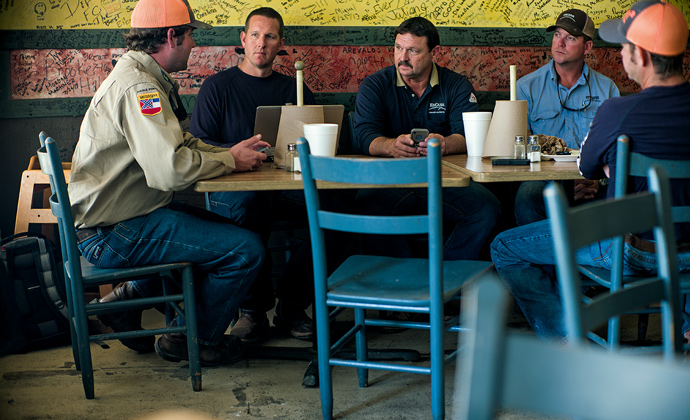
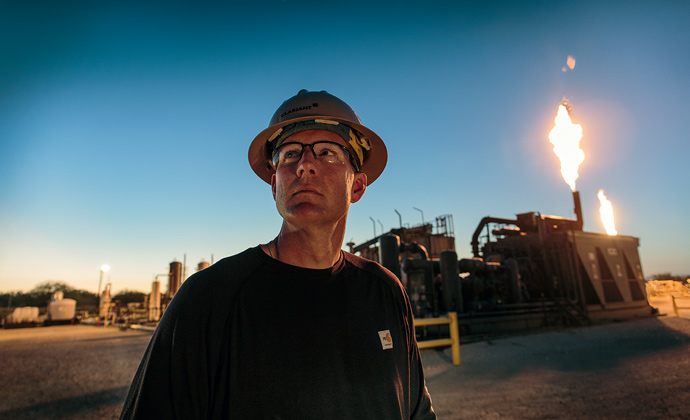
»Hard work always pays off.« That’s what grandpa Walter preached, who spent a lot of time with his grandson. Grandpa Walter was an old-school entrepreneur who made millions with a transportation company in Brazil but always remained extremely frugal. As was James’ father, a former Green Beret who later on as a police officer tracked organized crime in Houston. His son James, the only one of three children who stayed with his father after the divorce, had to take care of all the household chores. But he doesn’t regret the abrupt end to his childhood: »I enjoyed being responsible. I have a passion for it.«
Attending college would hardly have been possible under these circumstances. But due to his accomplishments in American football, the young man was given a scholarship to Northwestern Oklahoma State University (NWOSU) in Alva, a small town with 5 000 residents. This was the initial manifestation of his family’s work ethic. James won the coveted defensive lineman position not based on his natural talent, but because of his ambition and lots of training. The same ambition inspired him while attending law school.
Today, it is without a doubt that he wants those around him to succeed – first and foremost, his teammates. He wants to be a »Servant Leader« to them, not a classic manager – on par with Robert K. Greenleaf, the founder of the theory of the selfless leader. He strives to be the kind of leader who puts the development of his teammates above everything else, putting into practice what he learned in school. And there is one more difference: »Managers demand respect. Leaders earn respect.«
»I want people on my team to accomplish things that no one has done before, and it is my responsibility to support them.«
Almost everything is permitted at the facility – except for these three phrases: »We can’t,« »We try,« and »This is not my job.« The leader enforced this from the beginning. He is convinced that every person has unlimited potential and simply has to be placed in the right position to develop it. With this approach, he is always buddy and coach at the same time. Begeal notes, »I want people on my team to accomplish things that no one has done before, and it is my responsibility to support them.«
On this glorious morning, the day starts with the coffee machine in the kitchen. Begeal turns it on as soon as he gets to the office. For a long time, this first task of the day has symbolized Begeal’s understanding of what it is to be a servant of his team – through his willingness to perform a simple service that is traditionally reserved for the team assistant or somebody else, but not for the boss.
Perhaps it’s because James Allen Begeal, born in 1980, has always been happiest in a community – like in Sundown, when he played street basketball with boys from the neighborhood, or when they built huts from tree branches at the nearby canal. And in Alva, on the NWOSU Rangers football team, it was the same.
They played in the national college championship two years in a row. They won the first year (1999), and Begeal was voted into the All-Conference Team in 2001 – the team made up of the best players in the division. Overall, they probably didn’t have the strongest team. »But we went undefeated,« reminisces James. »We had the best winning culture, the best atmosphere. And once a positive culture is in place, the sky is the limit.«
This experience was more than just about sports. It demonstrated what is possible when everyone serves a common goal. He is convinced that »You can be a good team member and work very hard and rise to your potential. Or you can be a bad teammate and not work hard, and the team suffers. But either way, you have a decision to make, and your decision affects other people around you.«
»Help people achieve their goals and they’re going to help you achieve your goals. But the people come first.«
Begeal certainly made his decision. Wherever he led a team after obtaining his law degree, it soon became more successful: the shipping and logistics department of a company in Houston, three different departments of the same company in Oklahoma, in Sugar Land, Texas, and again in Houston. His formula is always the same and sounds almost too simple: »Help people achieve their goals and they’re going to help you achieve your goals. But the people come first.«
There are plenty of leaders who know how to hide their cynicism behind phrases that sound good but don’t really mean anything in practice. If you accompany Begeal throughout his days and weeks, however, you will find no gap in his performance. He is always available, from early morning to evening, to help team members reach an agreement with business partners or prospects. He constantly changes his language when speaking with men on the oil fields, engineers and decision makers, but he always sends the same message: I am interested in what you have to say, and if it makes sense, we can work together.
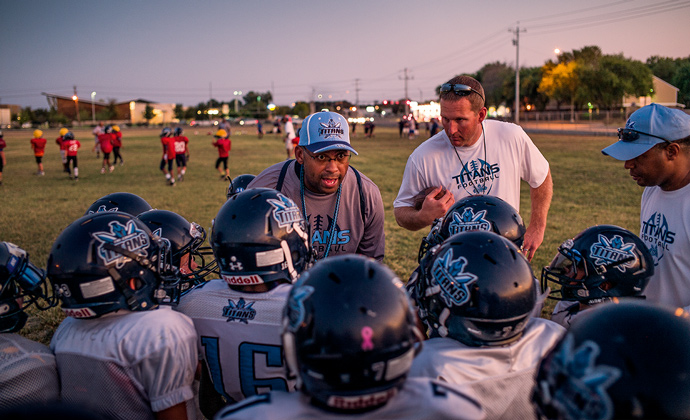
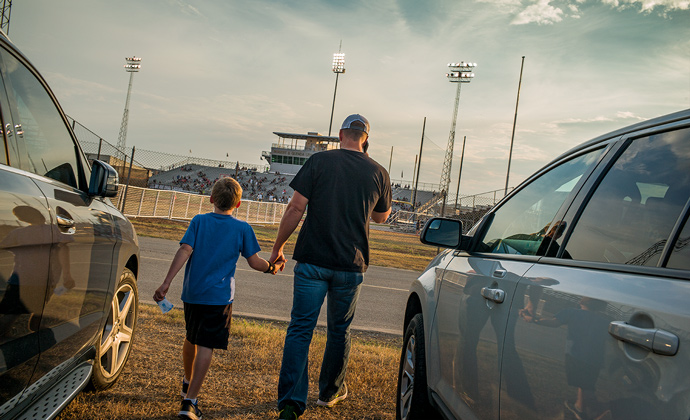
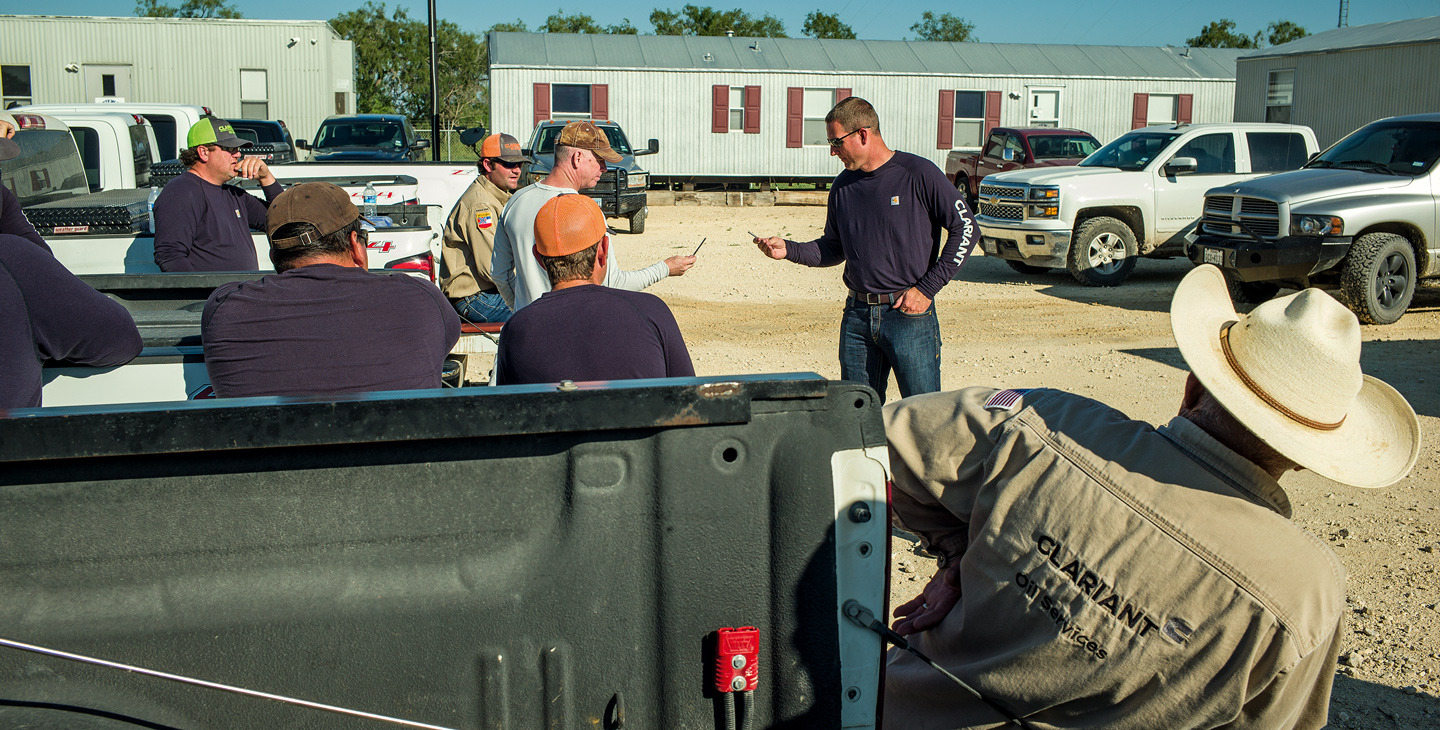
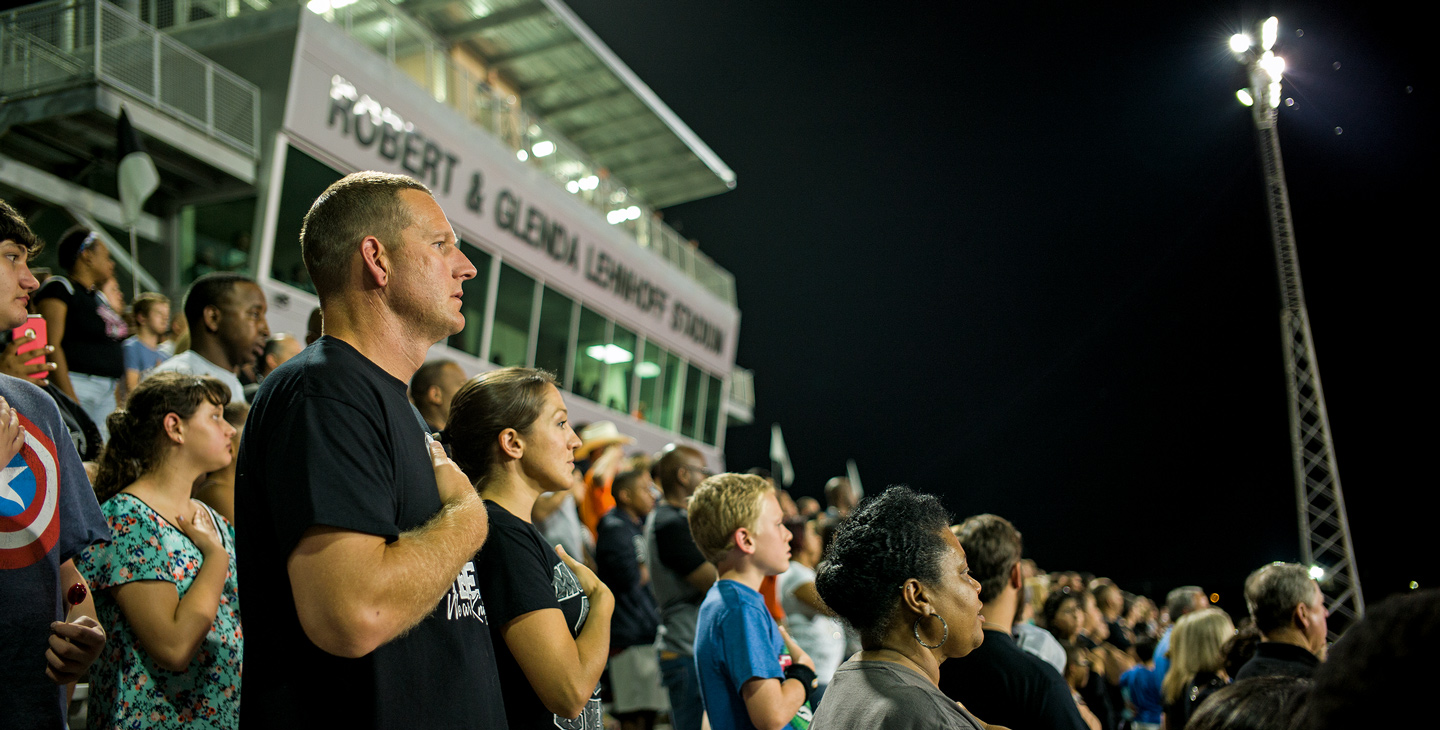
After all, business in Texas is conducted »casually.« In a barbecue shack in Nixon, a one-horse town in the county of Gonzalez, Begeal and two teammates, together with two representatives of a large energy company, enjoy a meal of smoked meat before getting down to business. It almost appears incidental when he pulls his laptop out of his backpack with freshly cleaned fingers in order to present a new, cost-reducing solution for an old production problem. The interest in it is obviously great, and if a business transaction develops from the meeting, it will involve several million dollars.
Maybe at some point, attorneys in elegant offices will finish up sealing this new deal later on. But the decisive factor is whether the two representatives, Casey and Kenny, trust James and his guys, and whether they can make their mark in their own organization with what they were shown on the computer – almost as if it had been their own idea. For their counterpart, who is already in his pick-up truck again, that is slightest problem. As Begeal reflects, »If it would be just about the credit, I’d be just like everybody else. My goal is to make Clariant as much money as I can by being responsible to my team and my business partners.«
In the late afternoon, James Begeal is already with the next group, the next shift. He is still wearing his jeans made of fireproof material when he interacts with the newest football recruits on the high school grounds in Schertz. He arrived 30 minutes early at the training site with his eight-year-old son Tyler to practice throws and catches. That is part of their plan, because what is the mantra so often repeated from father to son? »To beat the best, you have to work harder than the best.«
It is already getting dark when the two high-five each other at the end of practice and drive home in the Silverado. Home for them is in Turning Stone, in a small cul-de-sac in an expansive development of new homes. All the homes built here appear to be constructed from the same earth-colored bricks with basketball hoops in the driveways and perfectly trimmed lawns. Those who live here primarily want to be safe. They don’t necessarily want to be unique or different from their neighbors.
The Begeals were the first ones to move into their home. James’ second wife, Kelly, an energetic woman with chestnut-brown eyes, remembers the move-in as being a little scary at first. They each brought two children into the marriage, and each child needs to be driven to sports activities at least twice a week. Kamille, also known as »Kammy,« the oldest, goes to wrestling. Coulton, also known as »Cole,« goes to karate. And then there are Wyatt, or »Wy,« and Tyler also known as »Ty,« the two football players. Plus, there are four dogs of various sizes, a lawn behind the house, and a terrace, where Kelly’s husband likes to grill steaks for fajitas.

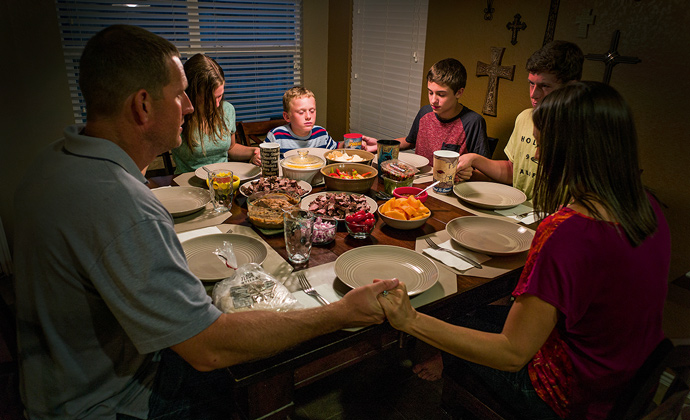
Begeal never would have needed this much space and comfort for himself. »I’m happy in a box,« he says. But this is really all about his second attempt to establish a trusting team that sticks together. That’s why they hike together through the state parks, pray together before meals and attend worship service on Sundays at a »Church for Everyday People.« James believes that some divine power gave him the strength to make it through the difficult phase of being a single parent working full time. »There was no way I could do that on my own,« he remembers. Since then he has become a faithful Christian.
There is an open kitchen between these walls, but no television screen and no junk food. There is a lockable cabinet with pistols and rifles – self-defense Texas style – and an aphorism on the wall behind the dining table below a row of crosses that reads: »God bless this house with love and laughter.«
»I like the freedom of being outside. This is a great mix of business and cowboy.«
James hopes to stay here for the next several years, especially to take advantage of the high-quality schools in the area for the children. Furthermore, there are still lots of reserves in the so-called »Eagle Ford.« This solidifies the future in this key sector as well as for James Begeal. For now, he can continue to live his life and focus his attention in Turning Stone as well as around Pleasanton. He muses, »I like the freedom of being outside. This is a great mix of business and cowboy.«

2014
»If you respect people’s dignity, teamwork becomes incredibly finely tuned.«
Mini Nair, Global Topic Expert & Sales Manager – BU Masterbatches
Navi Mumbai, India
View this story

2013
»We are an innovative and at the same time democratic company, have transparent procedures when selecting staff, and promote a variety of talents.«
Marcia Regina da Silva Rios, Head of Industrial Application LATAM – BU Industrial & Consumer Specialties
São Paulo, Brazil
View this story

2012
»Consensus is important. I always try to reach it in dialog with my employees, for as we say in China: three individuals together equal one genius.«
Qinglin Zheng, General Manager – BU Industrial & Consumer Specialties
Zhenjiang, China
View this story








